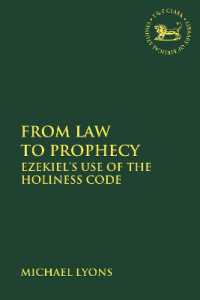Full Description
During his lifetime, Alexandre Dumas (1802-1870)--grandson of a Caribbean slave and author of The Three Musketeers and The Count of Monte Cristo--faced racial prejudice in his homeland of France and constantly strove to find a sense of belonging. For him, "Monte Cristo" was a symbol of this elusive quest.
It proved equally elusive for those struggling to overcome slavery and its legacy in the former French colonies. Exiled to the margins of society, 19th and 20th century black intellectuals from the Caribbean and Africa drew on Dumas' work and celebrity to renegotiate their full acceptance as French citizens. Their efforts were influenced by earlier struggles of African Americans in the decades after the Civil War, who celebrated Dumas as a black American hero.
Contents
Table of Contents
Acknowledgments viii
Preface
Introduction
1. "Black Skin, White Masks" in Nineteenth-Century France: Alexandre Dumas and His Experiences as an Exotic Other, 1829-1870
2. A Hero of Assimilation: Alexandre Dumas and the French Caribbean, 1848-1930
3. Creating a Local Black Identity in a Global Context: Alexandre Dumas as an African American Lieu de Mémoire, 1840-1930
4. Forgetting Alexandre Dumas: Négritude and the French Caribbean and Africa in the Mid-Twentieth Century, 1930-1970
5. Alexandre Dumas Métissé: Celebrating Dumas as a Symbol of a Diverse France, 1946-2002
Chapter Notes
Bibliography
Index







